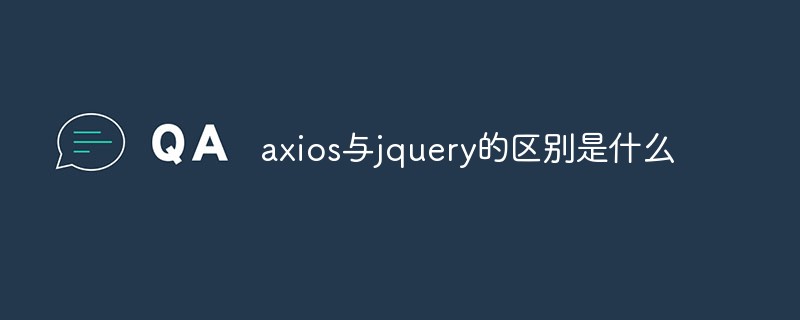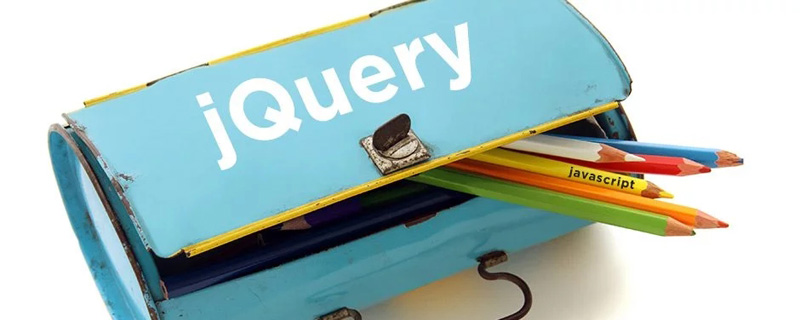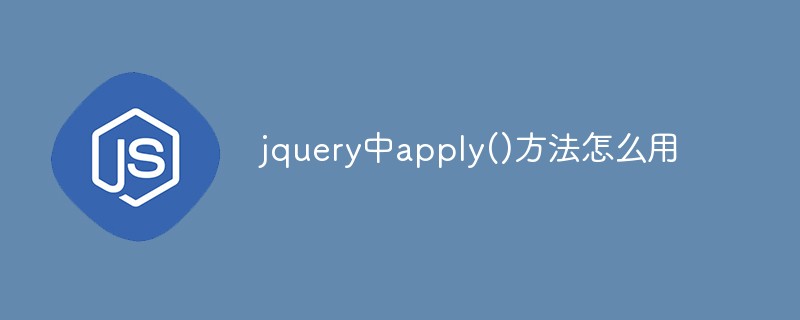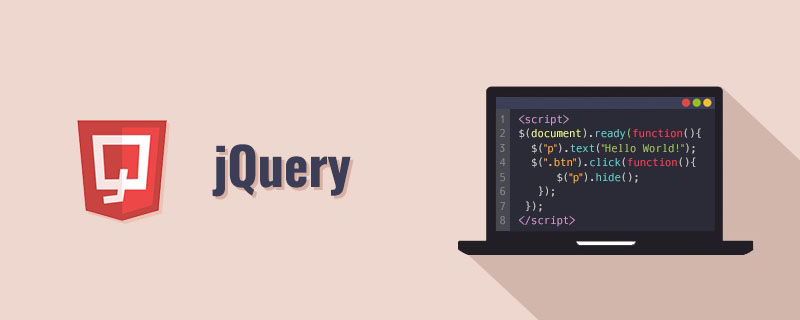1. jQuery Ajax events
Ajax requests will generate several different events, and we can subscribe to these events and process our logic in them. There are two types of Ajax events in jQuery: local events and global events.
Local events are defined within the method for each Ajax request. For example:
$.ajax({
beforeSend: function(){
// Handle the beforeSend event }, complete: function(){
// Handle the complete event } // ... });Global events are triggered for each Ajax request, and they will be sent to all items in the DOM. Element broadcast, the script loaded in the getScript() example above is the global Ajax event. Global events can be defined as follows:
$("#loading").bind("ajaxSend", function(){
$(this).show();
}).bind("ajaxComplete", function(){
$(this).hide();
});or:
$("#loading").ajaxStart(function(){
$(this).show();
});We can disable global events in specific requests, just set the global option:
$.ajax({
url: "test.html",
global: false,// 禁用全局Ajax事件. // ... });2 . jQuery.get(url, [data], [callback], [type]): Use GET method to make asynchronous requests
Parameters:
url (String ): The URL address to send the request.
data (Map): (Optional) The data to be sent to the server, expressed in the form of Key/value pairs.
callback (Function): (optional) Callback function when loading is successful (this method is called only when the return status of Response is success).
type (String): (Optional) The official description is: Type of data to be sent. In fact, it should be the type of client request (JSON, XML, etc.)
This is a simple GET request function to replace the complex $.ajax. The callback function can be called when the request is successful. If you need to execute a function on error, use $.ajax. Sample code:
$.get("./Ajax.aspx", {Action:"get",Name:"lulu"}, function (data, textStatus){
//返回的 data 可以是 xmlDoc, jsonObj, html, text, 等等. this; // 在这里this指向的是Ajax请求的选项配置信息;
//alert(textStatus);//请求状态:success,error等等。
当然这里捕捉不到error,因为error的时候根本不会运行该回调函数 //alert(this); });Click to send a request:
This in the jQuery.get() callback function points to the option configuration information of the Ajax request
3. jQuery. post( url, [data], [callback], [type] ): Use POST method to make asynchronous requests
Parameters:
url (String): URL address to send the request.
data (Map): (Optional) The data to be sent to the server, expressed in the form of Key/value pairs.
callback (Function): (optional) Callback function when loading is successful (this method is called only when the return status of Response is success).
type (String): (Optional) The official description is: Type of data to be sent. In fact, it should be the type of client request (JSON, XML, etc.)
This is a simple POST request function to replace the complex $.ajax. The callback function can be called when the request is successful. If you need to execute a function on error, use $.ajax. Sample code:
Ajax.aspx:
Response.ContentType = "application/json";
Response.Write("{result: '" + Request["Name"] + ",你好!(这消息来自服务器)'}");jQuery Code:
$.post("Ajax.aspx", { Action: "post", Name: "lulu" },
function (data, textStatus){
// data 可以是 xmlDoc, jsonObj, html, text, 等等. //this; // 这个Ajax请求的选项配置信息,请参考jQuery.get()说到的this alert(data.result);
}, "json");Click to submit:
The request format is set to "json":
If you set the request format to "json" and you do not set the ContentType returned by the Response to: Response.ContentType = "application/json"; then you will not be able to capture the returned data.
Note, alert(data.result); Since the Accept header is set to "json", the data returned here is an object, and there is no need to use eval() to convert it to object.
The above is the detailed content of Description of ajax events and get and post requests in jquery. For more information, please follow other related articles on the PHP Chinese website!
 jquery实现多少秒后隐藏图片Apr 20, 2022 pm 05:33 PM
jquery实现多少秒后隐藏图片Apr 20, 2022 pm 05:33 PM实现方法:1、用“$("img").delay(毫秒数).fadeOut()”语句,delay()设置延迟秒数;2、用“setTimeout(function(){ $("img").hide(); },毫秒值);”语句,通过定时器来延迟。
 axios与jquery的区别是什么Apr 20, 2022 pm 06:18 PM
axios与jquery的区别是什么Apr 20, 2022 pm 06:18 PM区别:1、axios是一个异步请求框架,用于封装底层的XMLHttpRequest,而jquery是一个JavaScript库,只是顺便封装了dom操作;2、axios是基于承诺对象的,可以用承诺对象中的方法,而jquery不基于承诺对象。
 jquery怎么修改min-height样式Apr 20, 2022 pm 12:19 PM
jquery怎么修改min-height样式Apr 20, 2022 pm 12:19 PM修改方法:1、用css()设置新样式,语法“$(元素).css("min-height","新值")”;2、用attr(),通过设置style属性来添加新样式,语法“$(元素).attr("style","min-height:新值")”。
 jquery怎么在body中增加元素Apr 22, 2022 am 11:13 AM
jquery怎么在body中增加元素Apr 22, 2022 am 11:13 AM增加元素的方法:1、用append(),语法“$("body").append(新元素)”,可向body内部的末尾处增加元素;2、用prepend(),语法“$("body").prepend(新元素)”,可向body内部的开始处增加元素。
 jquery怎么删除div内所有子元素Apr 21, 2022 pm 07:08 PM
jquery怎么删除div内所有子元素Apr 21, 2022 pm 07:08 PM删除方法:1、用empty(),语法“$("div").empty();”,可删除所有子节点和内容;2、用children()和remove(),语法“$("div").children().remove();”,只删除子元素,不删除内容。
 jquery中apply()方法怎么用Apr 24, 2022 pm 05:35 PM
jquery中apply()方法怎么用Apr 24, 2022 pm 05:35 PM在jquery中,apply()方法用于改变this指向,使用另一个对象替换当前对象,是应用某一对象的一个方法,语法为“apply(thisobj,[argarray])”;参数argarray表示的是以数组的形式进行传递。
 jquery怎么去掉只读属性Apr 20, 2022 pm 07:55 PM
jquery怎么去掉只读属性Apr 20, 2022 pm 07:55 PM去掉方法:1、用“$(selector).removeAttr("readonly")”语句删除readonly属性;2、用“$(selector).attr("readonly",false)”将readonly属性的值设置为false。
 jquery on()有几个参数Apr 21, 2022 am 11:29 AM
jquery on()有几个参数Apr 21, 2022 am 11:29 AMon()方法有4个参数:1、第一个参数不可省略,规定要从被选元素添加的一个或多个事件或命名空间;2、第二个参数可省略,规定元素的事件处理程序;3、第三个参数可省略,规定传递到函数的额外数据;4、第四个参数可省略,规定当事件发生时运行的函数。


Hot AI Tools

Undresser.AI Undress
AI-powered app for creating realistic nude photos

AI Clothes Remover
Online AI tool for removing clothes from photos.

Undress AI Tool
Undress images for free

Clothoff.io
AI clothes remover

AI Hentai Generator
Generate AI Hentai for free.

Hot Article

Hot Tools

Zend Studio 13.0.1
Powerful PHP integrated development environment

SublimeText3 English version
Recommended: Win version, supports code prompts!

Dreamweaver Mac version
Visual web development tools

ZendStudio 13.5.1 Mac
Powerful PHP integrated development environment

Dreamweaver CS6
Visual web development tools





